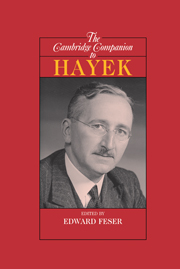Book contents
- Frontmatter
- Introduction
- 1 Hayek and the Austrian tradition
- 2 Hayek on money and the business cycle
- 3 Hayek and market socialism
- 4 Hayek and Marx
- 5 Hayek versus Keynes: the road to reconciliation
- 6 Hayek on knowledge, economics, and society
- 7 Hayek and Popper: the road to serfdom and the open society
- 8 Hayek’s politics
- 9 Hayek the philosopher of law
- 10 Hayek and liberalism
- 11 Hayek and conservatism
- 12 Hayek on the evolution of society and mind
- 13 Hayek on justice and the order of actions
- 14 Hayek the cognitive scientist and philosopher of mind
- Guide to Further reading
- Bibliography
- Index
11 - Hayek and conservatism
Published online by Cambridge University Press: 28 January 2007
- Frontmatter
- Introduction
- 1 Hayek and the Austrian tradition
- 2 Hayek on money and the business cycle
- 3 Hayek and market socialism
- 4 Hayek and Marx
- 5 Hayek versus Keynes: the road to reconciliation
- 6 Hayek on knowledge, economics, and society
- 7 Hayek and Popper: the road to serfdom and the open society
- 8 Hayek’s politics
- 9 Hayek the philosopher of law
- 10 Hayek and liberalism
- 11 Hayek and conservatism
- 12 Hayek on the evolution of society and mind
- 13 Hayek on justice and the order of actions
- 14 Hayek the cognitive scientist and philosopher of mind
- Guide to Further reading
- Bibliography
- Index
Summary
In the well-known postscript to The Constitution of Liberty, entitled “Why I Am Not a Conservative,” Hayek states what he calls “the decisive objection to any conservatism which deserves to be called such,” which is “that by its very nature it cannot offer an alternative to the direction in which we are moving . . . The tug of war between conservatives and progressives can only affect the speed, not the direction, of contemporary developments.” He adds that while the conservative “generally holds merely a mild and moderate version of the prejudices of his time, the liberal today must more positively oppose some of the basic conceptions which most conservatives share with the socialists.”
At the time when those words were published - 1960 - they expressed an understandable distrust of European conservative parties, which seemed unable to offer an alternative vision to the collectivism that had prevailed in Europe since the Second World War. Hayek dedicated his book to “the unknown civilisation that is growing in America,” and he showed his impatience with the old elites of Europe, whose principal concern, in Hayek's eyes, was to rescue from the jaws of the socialist machine as many of their privileges as they could, but who had no adequate rival notion as to how we should be governed. It is true that The Road to Serfdom, published toward the end of the war as a warning against the collectivism that had caused it, had been excitedly endorsed by conservatives and proposed as their bible by Winston Churchill.
- Type
- Chapter
- Information
- The Cambridge Companion to Hayek , pp. 208 - 231Publisher: Cambridge University PressPrint publication year: 2006
- 8
- Cited by

